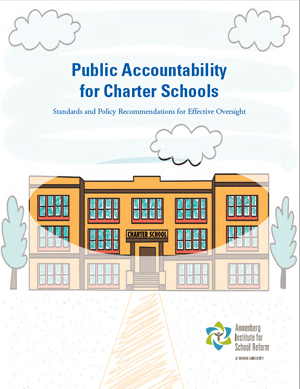Nashville school board to consider more transparency for charter schools
Nashville’s school board is scheduled to discuss tonight potential adoption of public accountability standards for charter schools that would require, among other things, more transparency about how they operate and how public money is spent.
Charter schools in Tennessee are already required to abide by the state’s Open Meetings Act (T.C.A. 49-13-138) and Public Records Act (T.C.A. 49-13-140), as well as abide by whatever governance requirements laid out by the school district that granted the charters.
But instances of fraud and malfeasance by charter school operators across the country have prompted school advocates and lawmakers in some states to propose additional accountability measures that provide more transparency for charter schools.
Nashville’s school board will consider standards laid out in a recent report by the the Annenberg Institute for School Reform, “Public Accountability for Charter Schools: Standards and Policy Recommendations for Effective Oversight.”
Leigh Dingerson, a consultant to the Annenberg Institute who wrote the report based on two years of study by a working group of parents, citizens and students, said the report was meant to draw upon the experiences of others across the country and provide standards that help protect school districts from problems that have occurred in other places. All of the standards in the report come from policies somewhere in the country, sometimes policies that were adopted after problems occurred.

The Annenberg Institute report is a result of a two-year study and draws upon policies and practices around the country.
“There was a report finding $200 million in lost public funds due to fraud and malfeasance in charters schools in 15 states,” Dingerson said. “There are so many examples of how things can go wrong around the country that if Nashville hasn’t run into those problems yet, that’s wonderful, but it doesn’t mean you shouldn’t protect yourselves against them.”
Since the report was released, lawmakers in eight to 10 states have proposed changing laws to incorporate some of the standards. Illinois has adopted language around school discipline policy, data collection and transparency, she said. A few have adopted specific requirements that conform with public meetings and public records laws.
Some of the standards outlined in the report include:
- Require that members of charter school governing boards file full financial disclosure reports and identify any potential conflicts of interest, relationships with management companies, or other business dealings with the school, its management company, or other charter schools.
- Require governing boards of charter schools to hold all meetings in the district in which their school or schools operate and at times that are convenient to parents.
- Require online access to minutes from charter school governing board meetings, the school’s policies, and information about management companies or other large contracts.
- Require full public financial disclosure by charter management organizations of their expenditures and profits related to the operation of each school they serve.
- Prohibit anyone with a financial relationship to a management organization or the staff of any authorizing agency from serving on the governing board of any charter school.
- Require all new charter applications to include detailed plans for the school’s enrollment and registration procedures to ensure that they will not result in selectivity.
- Require schools to report annually on all disciplinary actions and withdrawals from the school, including the reason for the student’s departure, suspension or other action.
- Require detailed monthly reports on enrollment, attrition, teaching staff, demographics and financial disclosures, including profits, from all online charter schools.
Some charter school operators have resisted adopting new requirements, saying it would add unnecessary bureaucracy. But Dingerson said the freedom given to charter schools to create educational innovation was not meant to allow charters to operate any way they wanted with public money.
“It’s somewhat mind-boggling that it would be considered a burden to have to report on student attrition from the school, or to report on finances. It should not be an imposition on a charter management organization to describe how they’ve used the (public) money … or who they are contracting with and how much their contractors are making.”
The Nashville school district currently maintains a web page that contains information about some of the accountability standards that it requires, and reports on performance.

